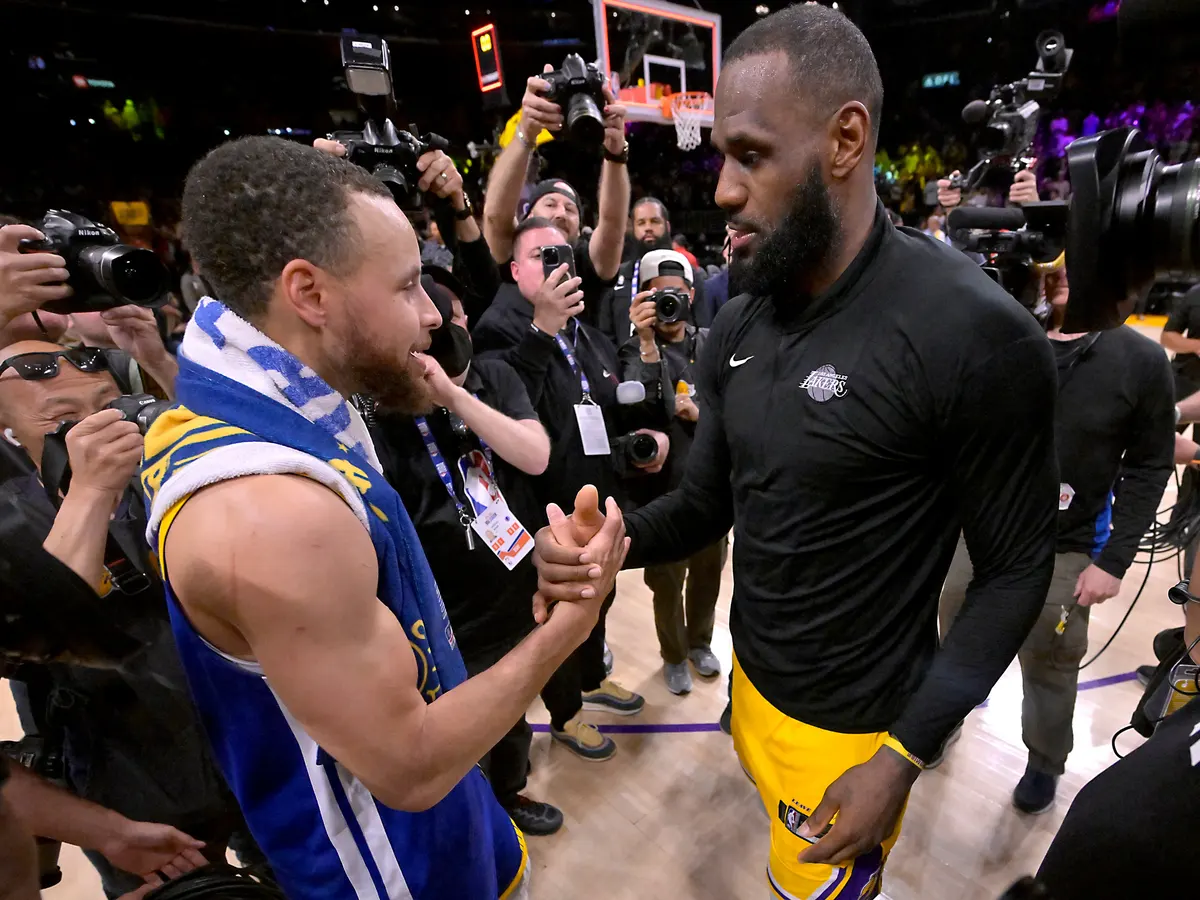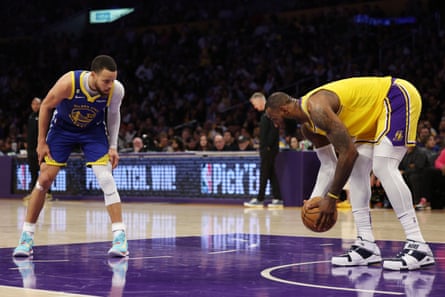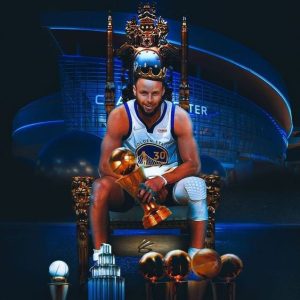
There are certain constants in our lives: north stars by which we can measure and trace the changes that occur around them as time passes us by. For the better part of the last decade, the steady fulcrum around which the NBA has revolved has been the special ongoing rivalry between future first-ballot Hall of Famers LeBron James and Stephen Curry.
Some basketball fans grew up at a time when they watched Magic Johnson and Larry Bird duke it out year after year, and other fandoms were formed during the swath of time in which extraordinary players, like Michael Jordan or Kobe Bryant, dominated the league and had no singular, definitive rival to speak of. Personally, basketball didn’t come into my life in a meaningful way until early adulthood, so for basically as long as I’ve been paying attention, an NBA centered around LeBron and Steph has represented the permanent blueprint. Any aspirant to the throne inevitably had to go through one or the other to reach the mountaintop, and for the four straight years Steph’s Warriors and LeBron’s Cavaliers met in the NBA finals (from 2015 to 2018), no one successfully did.
Because of this, it’s been hard to imagine a world in which the James v Curry battle wasn’t at least bubbling underneath the surface, if not outright dominating the headlines. So when the stars finally aligned for the two supernovas of the hardwood to meet in the postseason once again, for the first time in five years, it felt, in a way, as if all was right with the world.
But as their Western Conference semi-final series unfolded over the past week and half, something became clear that elicited both a palpable nostalgia and a bit of discomfort: this was the beginning of the end of this era. The post-LeBron James/Stephen Curry NBA is looming on the horizon, and their most recent battle only served as evidence that while both of their careers are far from over, their epic rivalry is much nearer to its end than its beginning.

In an almost poetic reversal, James and Curry found themselves in opposite positions during this most recent playoff clash from when they last met in 2018. Back then, Curry benefitted from a No 2 option who was arguably the No 1 (the eventual NBA finals MVP Kevin Durant); these days, LeBron shares the load with the world-beating Anthony Davis with a fresh and surprisingly deep supporting cast to buoy them. Unlike in previous years, Curry was made to single-handedly carry the Warriors throughout a tumultuous season, much as James did that year with a short-handed Cavaliers team.
Also reversed: the result. James posted 30 points, nine rebounds and nine assists in a closeout Game 6 win on Friday that eliminated the defending champions and lifted the Lakers into the NBA’s final four, a remarkable outcome for a team that was left for dead only a few months ago.
James was arguably at his peak the last time he faced Curry in the postseason. And while he was in total command during Friday night’s clincher, no one would dispute that he’s on the downside of his brilliant career. Even putting aside his age – he turns 39 later this year – one need look no further than the injuries that have dogged him over the last few seasons as evidence that a once seemingly invulnerable body is finally starting to show signs of susceptibility to the laws of physics. For much of this series, indeed, it was Davis and other members of the Lakers’ supporting players who got the team over the line when things got hairy. Curry, on the other hand, had one of his most dominant seasons ever this year, and it could be reasonably argued that, fresh off a fourth NBA championship and his first NBA finals MVP, the height of his abilities is occurring at this very moment.
The series that unfolded in Los Angeles and San Francisco didn’t quite paint that picture, as an authoritative Davis made Curry’s life hell defensively, and the wear and tear from the Warriors’ hard-fought seven-game war with a feisty Sacramento Kings team in the first round appeared to mount by end of the second. But it’s interesting that while James’s and Curry’s legacies seem to be indelibly bound to one another on an almost cosmic level – the two were famously born in the same hospital in Akron, Ohio – the arcs of their trajectories weren’t ever exactly in sync: like two sine waves on a graph, intersecting at moments but never following each others’ paths exactly. If age is any indication, we may very well be, in fact, soon approaching a version of the NBA which has a Steph Curry and not a LeBron James; something quite literally unprecedented.

The intuitive knowledge of that fact made this particular battle feel uniquely sentimental, and while watching I was struck somewhat with disbelief as I pondered: Will I ever see this again? The answer is unclear. But it was deeply apparent just from looking at the long, impassioned embrace between the two superstars at game’s end on Friday night not only how much respect is shared between them, but that even they knew how special this moment was: for them, and for the history books.
Curry himself put it best when asked by ESPN’s Malika Andrews to summarize the experience after the conclusion of the series: “It’s just a battle every time. And I know there are a lot of different narratives within each of the series that we’ve had, and different teams, and teammates and all of the above. But it’s just great basketball. Great competition. Understanding who LeBron is, and who he’s been his entire career, the accolades, the championships he’s won, the records that he has – he’s an amazing basketball player. He brings the best out of you, and you know you have to be your best if you’re gonna try to beat him. I think he feels vice versa. You love those experiences.
“Somebody’s got to win. It’s part of the nature of what we’re dealing with. But there’s so much respect and, again, appreciation for the battles and the experiences and the back-and-forths, because it’s basketball at the highest level, and that’s all you can ask for.”
All you can ask for, indeed.






